The Story of the Universe, of Earth, of Humans, and the Easter story
by Robert Fontana
“O God, you have been our refuge from all generations. Before the sun was born, before the galaxies came forth, and the Great Beginning, you are God from eternity and forever.” (Adapted from Psalm 90:1)

I remember the first time I saw photos from the Hubble telescope. THEY WERE STUNNING! Hubble captured images of stars, galaxies, nebulas and so much more, thousands of light years from Earth.
Hubble scientists focused its lens on a dark section of space and saw an astounding 50,000 galaxies. THAT’S GALAXIES NOT JUST STARS! Our own Milky Way Galaxy has an estimated 100-400 billion stars. EGADS! Our sun is a star. Imagine 400 billion of them times 50,000 that makes…wait let me ask one of my grands… “Ty, compute this for me!” There are unimaginable numbers of stars in the universe which is incomprehensibly vast.
Scientists estimate the universe to be 13.79 billion years old and Earth to be about 4.55 billion years old, give or take a few hundred million years.
Keep in mind that the “stuff” that makes up the stars and the planets, including Earth and all the creatures that inhabit the Earth, have a common origin in the beginning of the universe. Fr. Thomas Berry, who described himself as Geologian (Geologist + Theologian), wrote,
“To tell the full story of a single particle we must tell the story of the universe, for each particle is in some way intimately present to every other particle in the universe.” (The Universe Story – https://thomasberry.org/quotes/)
And…
“It takes a universe to bring human beings into being.” (Evening Thoughts – https://thomasberry.org/quotes/)
We humans emerged on earth only about 300,000 years ago. We are latecomers to life on the planet. According to Astronomy Workshop, if one could compress “the time the Universe existed into the span of a single day, with the Big Bang occurring at the stroke of midnight…humans crash the party at 11:59:56 pm, just four seconds before the end of the day.” (See https://janus.astro.umd.edu/front/pages/links/Time1.html)

In universe time, Jesus lived and died a nano-second ago.
As I marvel at the vastness of the universe story, I feel a tension between science and the Easter story, the Paschal Mystery: that God’s beloved son died for our sins, rose from the dead, was seen by a handful of his companions, ascended into heaven, and will come again at the end of time. All who are faithful to Jesus will live forever in paradise, and the unfaithful, well…
WHOA! It’s a story that sounds too good to be true. Too neat, too convenient. Why do only the followers of Jesus get to see the Risen Jesus? Why does he not show himself risen to all people? Can we really trust their story? No one can see him now, but don’t worry, he’s coming back. And when he does, he is going to wield a sword to strike down all the ungodly and bring everlasting life to his faithful followers. In the meanwhile, we try to live lives guided by the Holy Spirit as we wait for Jesus to come again.
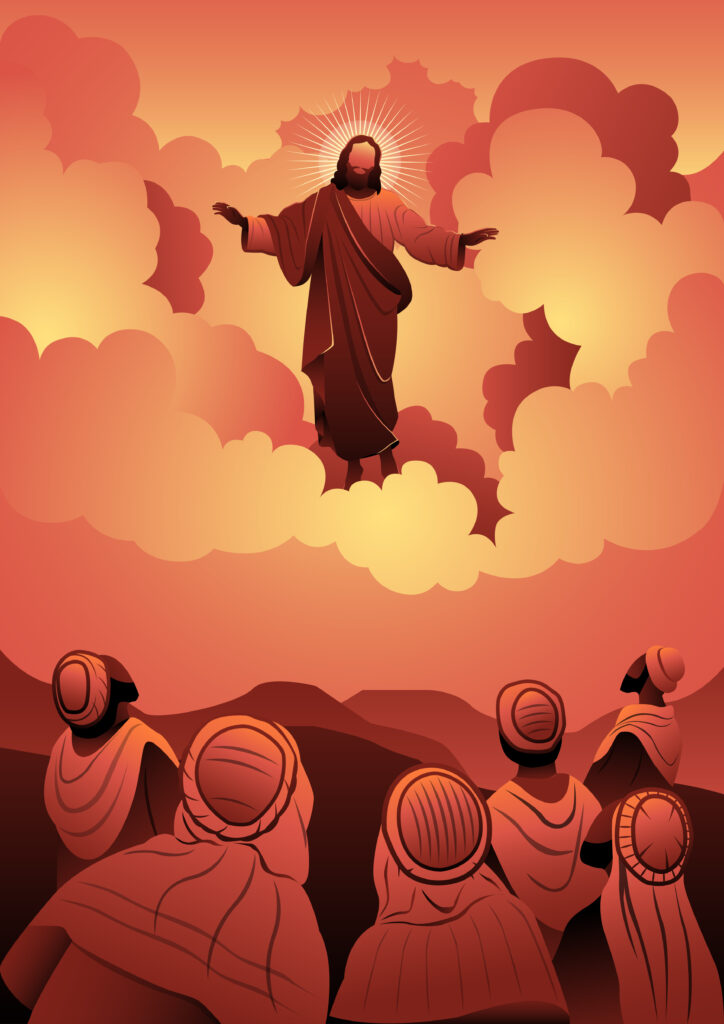
AND HOW DOES ALL THAT MESH WITH THE EVIDENCE FROM SCIENCE ON HOW THE UNIVERSE BEGAN, THE GALAXIES CAME FORTH, THE EARTH WAS FORMED AND HUMANS EMERGED?
I can just hear my agnostic college roommate saying, “With the evidence you have from science about the age and formation of the universe, do you believe this S**T?”
And, YES, I do believe, but it is not without some doubt and uncertainty.
Why do I believe the Easter story as presented in the Scriptures, proclaimed by the Christian community, and embraced by the saints? I think the primary reason is that I have experienced God’s love and forgiveness through my faith long before I began to grapple with the evidence from science. Initially, when I first saw the images of deep space taken by Hubble, I felt really scared. How could the story of Jesus and the story of the universe both by true? I felt like Moses when he was confronted by God in the burning bush. Do I throw water on the bush? Do I run away? Or do I follow God’s command to Moses: “Take off your sandals, for the place where you are standing is holy ground.” (Exodus 3:5) I chose the Moses route. And, yes, it was, and still is, a choice.
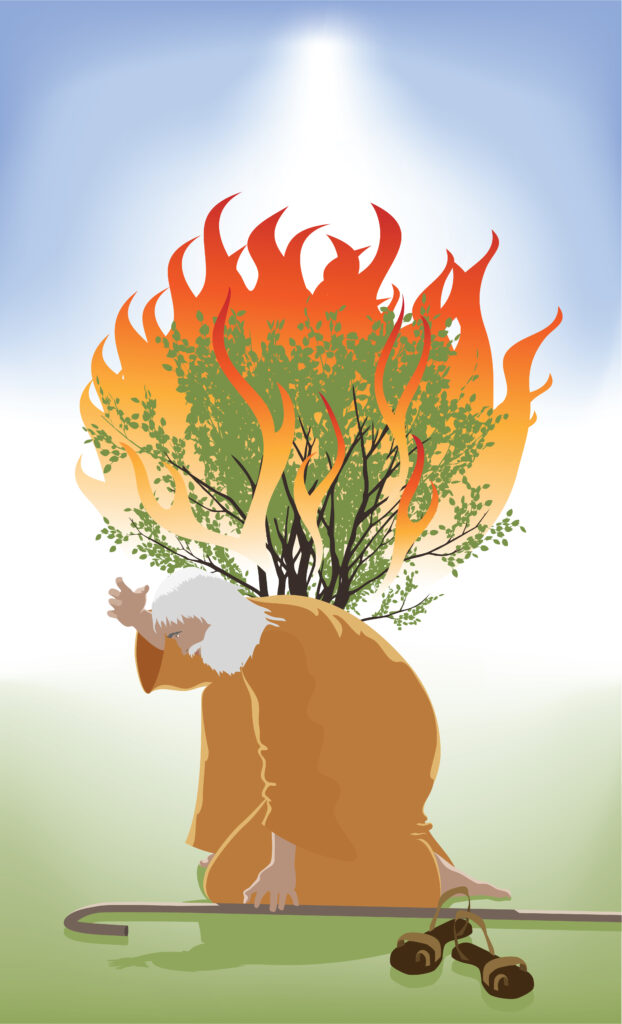
I also take my doubts to St. Paul. Reading his description of the appearances of Jesus gives me great comfort. Paul wrote his first letter to the Corinthians some 25 years after the death and resurrection of Jesus. It is the earliest written account that we have of the resurrection appearances, 15-20 years earlier than the written Gospels:
For I handed on to you as of first importance what I also received: that Christ died for our sins in accordance with the scriptures; that he was buried; that he was raised on the third day in accordance with the scriptures; that he appeared to Cephas, then to the Twelve. After that, he appeared to more than five hundred brothers at once, most of whom are still living, though some have fallen asleep. After that he appeared to James, then to all the apostles. Last of all, as to one born abnormally, he appeared to me. (1 Cor 15:3-9)
Paul’s summary of the appearances of Jesus is remarkable. Do I trust what he says? Do I trust what the Christian community has continued to say about Jesus for the past 2000 years even if Jesus’ life on Earth is just a nanosecond in universe time? YES!
During this Easter season I hold onto both remarkable stories as true: the story of the unfolding universe on which the human story is radically dependent, and the story of the saving work of Jesus through his life, death, resurrection, and sending of the Holy Spirit, on which the Christian story is radically dependent.
Alleluia! Happy, holy Easter!
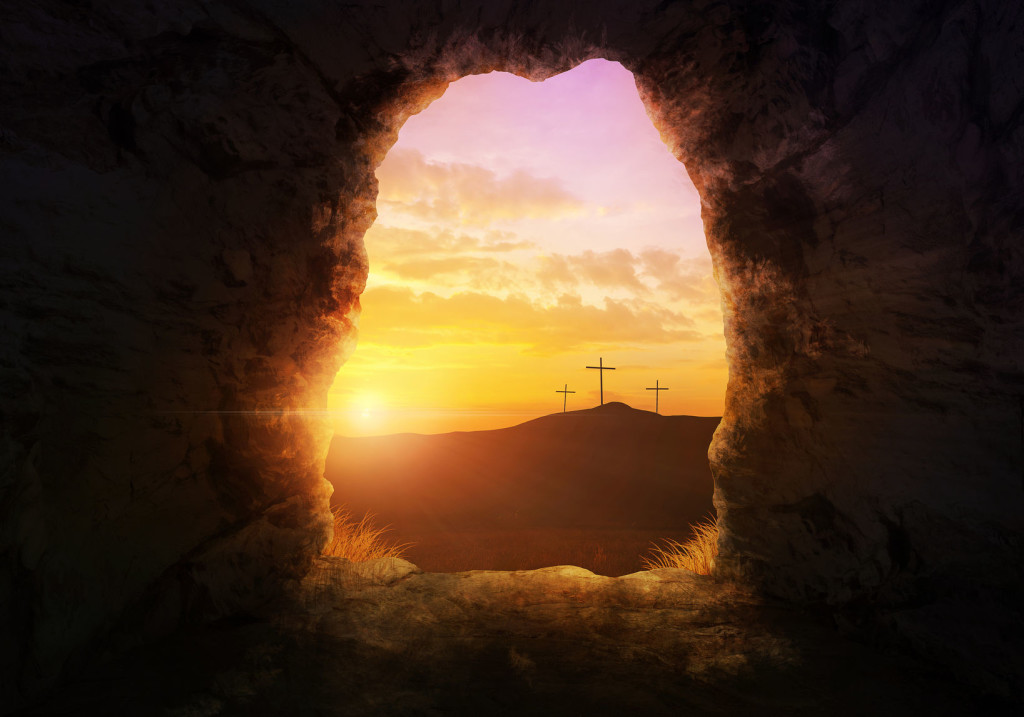
A head scratcher: Hebrews 5:8 – “Son though he was, he learned obedience through suffering.”
By Robert Fontana

No, no, no! Jesus was the perfect child. He was naturally obedient to his parents, at least except for his little escape to the temple without telling Joseph and Mary, when they were in a tizzy not knowing where he was. Then how would he have needed to learn obedience to God through what he suffered?
Our faith teaches us that Jesus suffered for our sins through his death on the cross. As St. Paul writes:
We proclaim Christ crucified, a stumbling block to Jews and foolishness to Gentiles, but to those who are called, Jews and Greeks alike, Christ the power of God and the wisdom of God. 1 Cor 1:23-24
Indeed, the entire sacramental life of the Catholic church is based on this conviction that we participate in the meaning of Christ’s death whenever we celebrate any of the Sacraments, but especially the sacraments of Eucharist and Baptism:
For as often as you eat this bread and drink this cup, you proclaim the death of the Lord until he comes. 1 Cor 11:26
…are you unaware that we who were baptized into Christ Jesus were baptized into his death? We were indeed buried with him through baptism into death, so that, just as Christ was raised from the dead by the glory of the Father, we too might live in newness of life. Rom 6:3-5
The New Testament writers understood that Jesus is the Suffering Servant written about by Isaiah (Isaiah 52:13 – 53:12):
But he was pierced for our offenses, crushed for our sins; upon him was the chastisement that makes us whole, by his stripes we were healed. We had all gone astray like sheep, each following his own way; but the LORD laid upon him the guilt of us all.
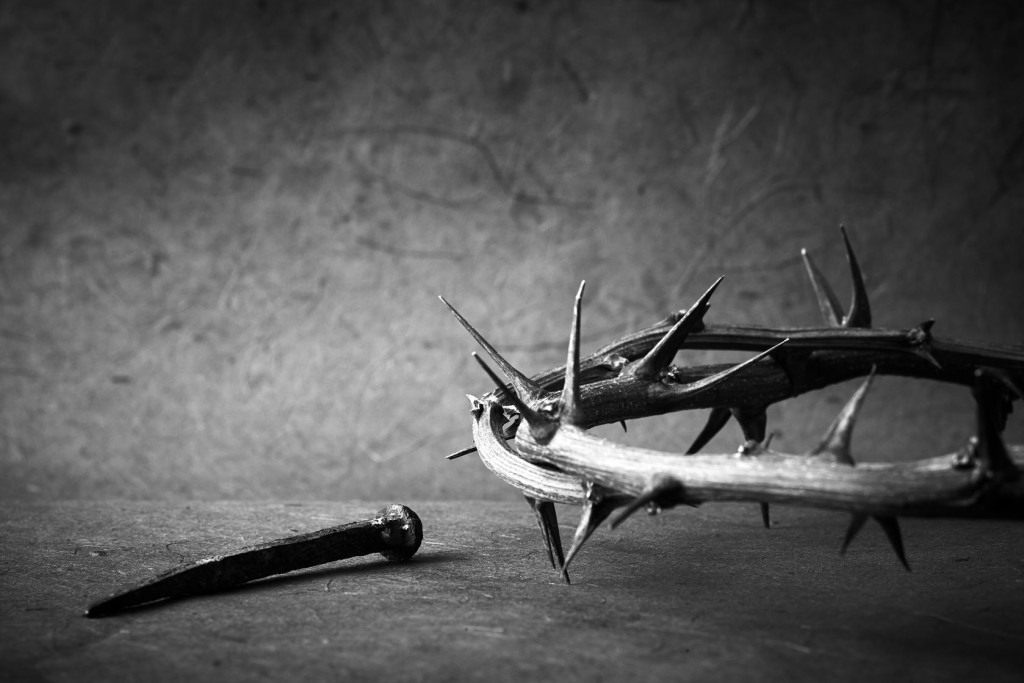
The letter to the Hebrews teaches us that suffering for Jesus had a purpose, to teach him to obey God’s will for his life. This didn’t happen just in the garden of Gethsemane when he prayed that the suffering that lay before him be taken away. No, Jesus was being trained from childhood to bear a variety of different forms of painful events that enabled him to literally take up his cross at Calvary. The ancient Christian hymn cited by St. Paul in his letter to the Philippians underscores this very point:
…though he was in the form of God, he did not regard equality with God something to be grasped. Rather, he emptied himself, taking the form of a slave, coming in human likeness; and found human in appearance, he humbled himself, becoming obedient to death, even death on a cross. Philippians 2:6-8
How did Jesus during his lifetime learn obedience through suffering? This is what I think.
(1) Jesus learned to say “yes” to God by saying “no” to temptation. Jesus was not just tempted when he encountered the Devil during his 40-day fast in the wilderness. He was tempted throughout his entire life with real temptations, as we all face. We have a glimpse of how Jesus was tempted when we read how he struggled in the garden to face the suffering and death that were coming: “Abba, Father, take this cup from me.” Mark 14:36
Did Jesus struggle in a similar way with other temptations? Why not? He was fully human in all ways but sin. He must have had to wrestle with the seven deadly sins – pride, anger, greed, envy, gluttony, lust, and laziness – as we all do.
For we do not have a high priest who is unable to sympathize with our weaknesses, but one who has similarly been tested in every way, yet without sin. Hebrews 4:15
(2) Jesus learned obedience to God by saying “no” to family expectations. His family and relatives from Nazareth were good Jews. They were just as offended by Jesus’ behavior as were the religious leaders, so much so that family members tried to remove Jesus from circulation, and the synagogue leaders of Nazareth had him expelled:
When his relatives heard of this, they set out to seize him, for they said, “He is out of his mind.” Mark 3:21
He came to Nazareth, where he had grown up, and went according to his custom into the synagogue on the sabbath day. They rose up, drove him out of the town, and led him to the brow of the hill on which their town had been built, to hurl him down headlong. Luke 4:16-29
I don’t think we can overstate how difficult this was for him in a kinship culture in which family relationships dominated Jewish life. Loyalty is expected, even demanded. Yet Jesus must break through family expectations to truly listen to his Father’s will for his life.

(3) Jesus learned obedience to God’s will by suffering through opposition from Jewish religious leaders. These leaders watched what Jesus was doing and were outraged by it: breaking Sabbath regulations; eating and drinking with tax collectors and prostitutes (sinners); including women as his disciples; healing servants of the hated Romans; and insisting that God’s love was breaking into the world through him. Their only explanation for such scandalous behavior was that Jesus must be possessed:
The scribes who had come from Jerusalem said, “He is possessed by Beelzebul,” and “By the prince of demons he drives out demons.” Mark 3:22
(4) Jesus learned obedience to God by suffering through the departure of many of his disciples who lost confidence in him. This loss of confidence began before the great betrayal of Jesus by his disciples on the night he was betrayed. John records that after Jesus finished a series of teachings, many of his disciples found what he said was so hard to take; and they left him. It got so bad that Jesus turned to the Twelve and said, “Do you also want to leave?” John 6:67-71 The Twelve, led by Peter, decided to stay.

(5) Jesus learned obedience to God as he confronted the reality that the “Good News” he was preaching will get him killed. As Jesus set his eyes on Jerusalem (Luke 9:51), it became clear to him that his Gospel message of the Kingdom of God would not find a home among his Jewish listeners. This clarified things for him. He knew that if he continued doing what he was doing, his future path was one of suffering and death. He was ready for it. He had been training for this moment his entire life. This is echoed in the letter to the Hebrews:
In the days when he was in the flesh, he offered prayers and supplications with loud cries and tears to the one who was able to save him from death, and he was heard because of his reverence. Son though he was, he learned obedience from what he suffered; and when he was made perfect, he became the source of eternal salvation for all who obey him. Hebrews 5:7-9
Jesus’ suffering as the “Suffering Servant” did not begin with Good Friday. He was being trained for his passion and death, for his Good Friday, throughout his entire life, as he learned to obey God’s will for him despite temptations, the opposition of religious leaders, the rejection by family and relatives from Nazareth, and the abandonment by some of his disciples and friends.
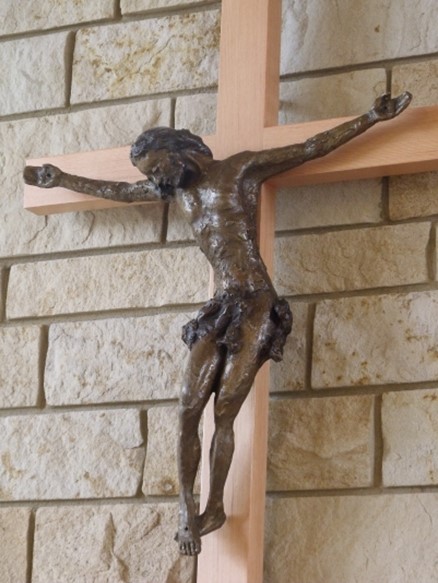
Perhaps the same is true for us. We too learn to do what is right, to do God’s will for our life, through our struggles with temptations, bad religion, and inadequate expectations from family and friends. The “Serenity Prayer” has a line that reads, “Suffering is the pathway to peace.” Jesus shows us the truth of that wisdom. He learned obedience through suffering; so do we.
The Lenten season that changed my life
By Robert Fontana
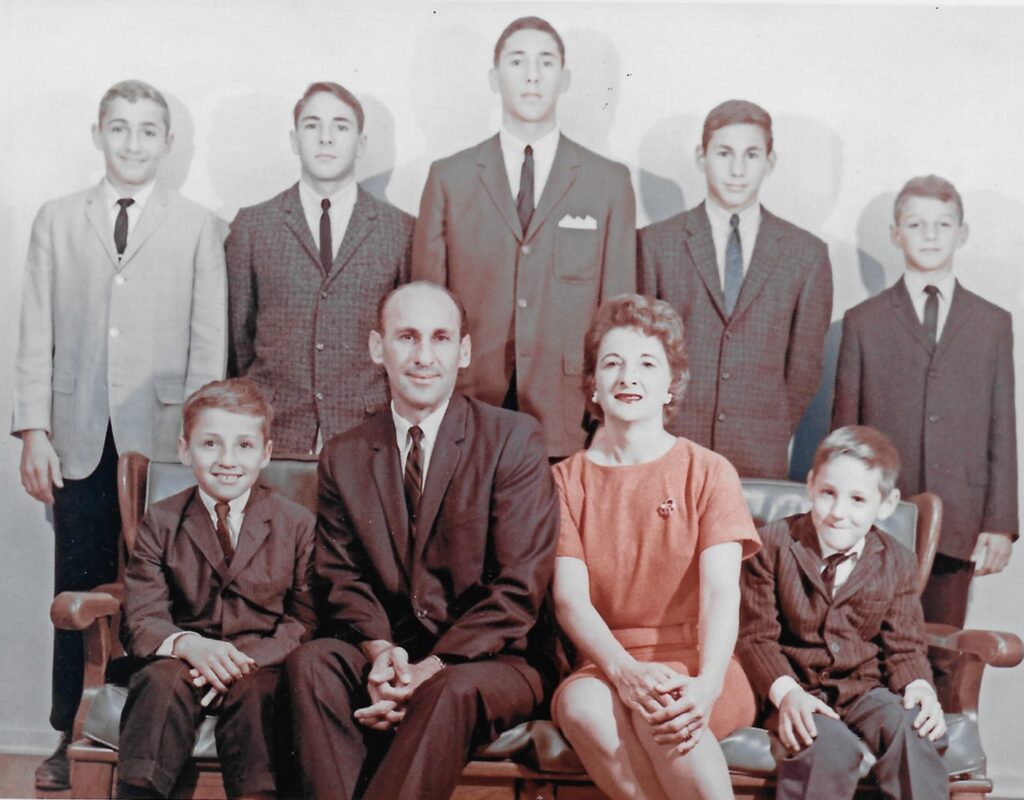
I was raised in a conventional Catholic family. Faith in God was tied to being part of a community of people that shared a culture based on specific practices: Mass on Sunday and holy days; praying the rosary, abstaining from meat on Fridays, etc. We were raised like the comedian Kathleen Madigan, who remembers how the nuns taught her,
“DON’T BOTHER JESUS! You have a guardian angel who’s with you 24/7; go to your him if you have a problem. You can turn to one of the saints; there’s one responsible for every facet of life. You can try Jesus’ mother – ask her for help. But DON’T BOTHER JESUS.”
Ok, maybe that’s a slight exaggeration.
We had a family Bible but never read it. Our only family review of Scripture was while praying the “mysteries” of the rosary which focused on Jesus’ birth, death, and resurrection. His life and teachings were assumed, I suppose, to be part of cultural Catholicism.
That all changed for my parents when, after 20 years of marriage, they weren’t getting along. Rather than going to a divorce court, they went to a Catholic Charismatic prayer meeting. Their lives were turned upside down. They met Jesus and the Holy Spirit in a surprising and beautiful way. They discovered God’s love for them and God’s will for them: to love one another. Their transformation became my transformation.
Throughout high school I struggled with all the things teenagers struggle with but what helped me to cope was daily Bible readings, prayer, and a desire to do God’s will. By the time I was a high school senior, I started hearing an inner voice that said, “Why don’t you become a priest?” I remember fighting it. “NO! I DON’T WANT THAT! I want to go to college, to watch football games, to date girls.”
God won that argument. I went to a college seminary situated on acres of pine woods north of New Orleans. It was my first experience of being in such a quiet environment with all boys and with NO GIRLS! I hated it.
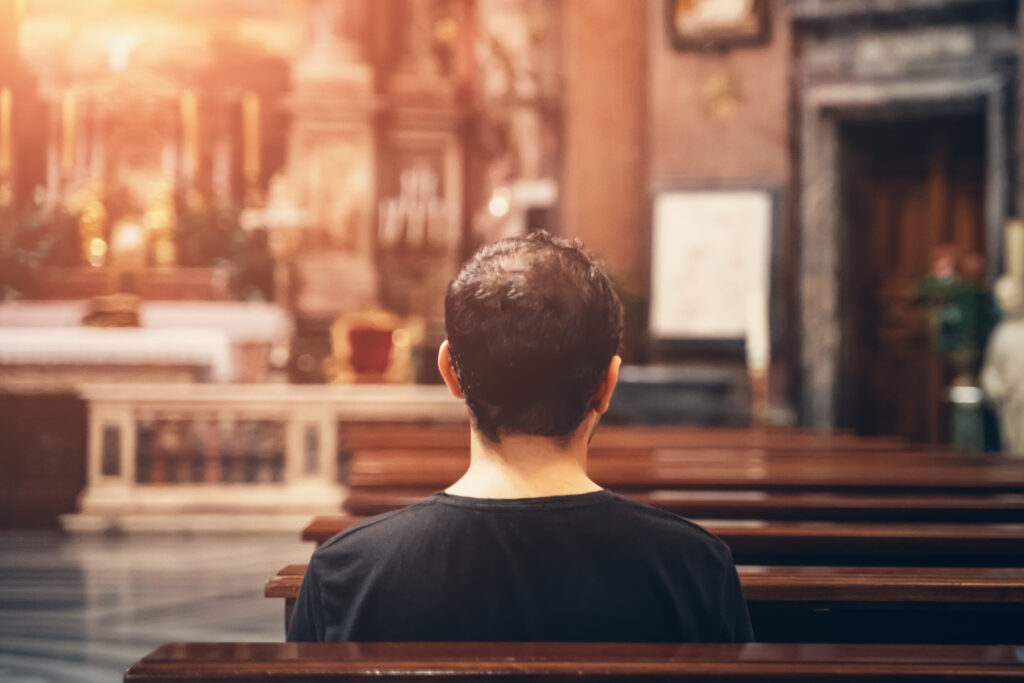
It took me a good month to transition to the rhythm of life offered by the Benedictine monks at St. Joseph Seminary. That life began with sung prayer of the Psalms at 6:15 in the morning, class beginning at 8:30 or 9 am, Mass at 11:15, more class, free time, and work study in the afternoon, evening prayer with the monks at 5:30 pm and night prayer with the seminarians at 9:30. I was being disciplined into a new way of being a Catholic follower of Jesus.
During a fall day of prayer, the retreat director, Fr. Ambrose, said something that seems simple and “duh” now, but at the time was very new to me. He suggested that we spend a lot of time outdoors and listen to “nature.” Many of my classmates laughed at his suggestion. Fr. Ambrose was a man who would not swat a mosquito sucking blood out of his arm because he wanted to learn something from the insect. Yet, for me, what he said struck me as truth.
I tried to tune in to nature during the day. The beautiful, natural surroundings touched me, had a calming effect on me. I would occasionally get up early before morning prayer and spend time alone at the nearby river.
When Lent came around the following Spring, Fr. Ambrose again gave us students a recommendation that I took to heart. He suggested that during these 40 days we remove one item from our room as an outward sign of removing an attachment in our heart that might be keeping us from loving God and loving my neighbor. That very night I resolved for Lent I would remove one item each day from my room, and I would begin each day with a half hour of silence at the river before morning prayer.
Something very profound began to happen to me. I became aware of the beauty, peace, and healing balm that nature had to offer me. By the time Holy Week came, my room was completely emptied of all items on my wall, bed, and bookshelf. My heart had become still, quieted by nature’s touch. I felt so close to God, at peace with myself and the world around me.
I learned from that Lenten journey what Moses, the prophets from the Hebrew Scriptures, Jesus, and the saints all knew from their life with God: nature is a primary place of encounter between God and humans.
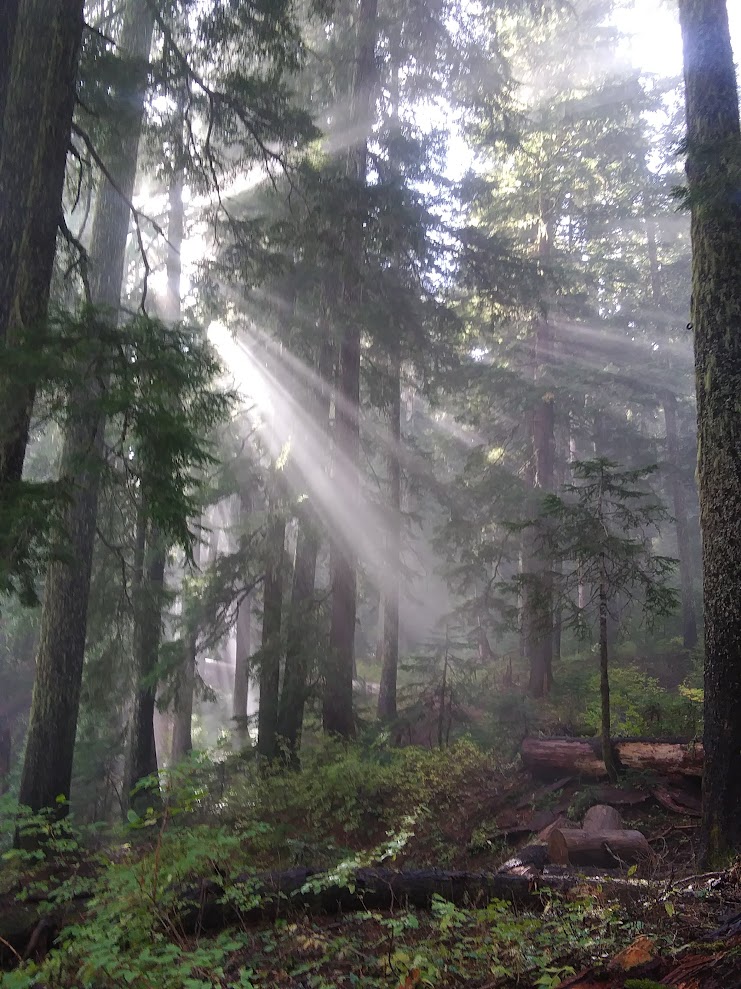
In Catholic language, nature is a “Sacrament.” It is an “outward sign, something one can experience through the senses – seen, touched, and heard – instituted by God, that gives grace.” In fact, it is the original “Sacrament” upon which all other Sacraments are built. Without nature, there is no “burning bush” before Moses, no “cloud by day” leading the Hebrews from Egypt, and no Word of God becoming “flesh” in baby Jesus.
Once while praying in a nearby park whose trees and shrubs were left to grow wild and free, I felt like I was in the womb of love. I wrote a poem about my relationship with the Sacrament of Nature inspired by the words of St. Augustine and an old Catholic hymn. I share it with you below. May you take time this Lent to cultivate a deeper life with God by allowing nature that you have access to – from your garden or nearby park to a mountain stream or the vast ocean – quiet your soul and draw you into a beautiful encounter with God.
“How late have I loved thee, O Nature, ever ancient and ever new.
O Sacrament most holy, O Sacrament divine, how late have I reverenced you, bowed before your beauty, knelt before your mystery like Moses before the burning bush.
You give life and death. You water, plant seeds, grow forests, birth creatures, including me, and receive us in death.
I played in your fields, ate from your fruits, stole from your treasures, always thinking you and I are different, separate. I had forgotten that I came from you, and I will return to you. As the Scriptures write, “For you are dust, and to dust you shall return.” (Gen 3:19) Clearly, I am nature too.
Forgive me, O sacred friend, forgive me for loving you too late, way too late, and having caused you so much harm. Late have I loved thee, O Beauty ever ancient and ever new, but it is not too late for me to change.

As you begin Lent, Remember to “Bury the Alleluia”
By Robert Fontana
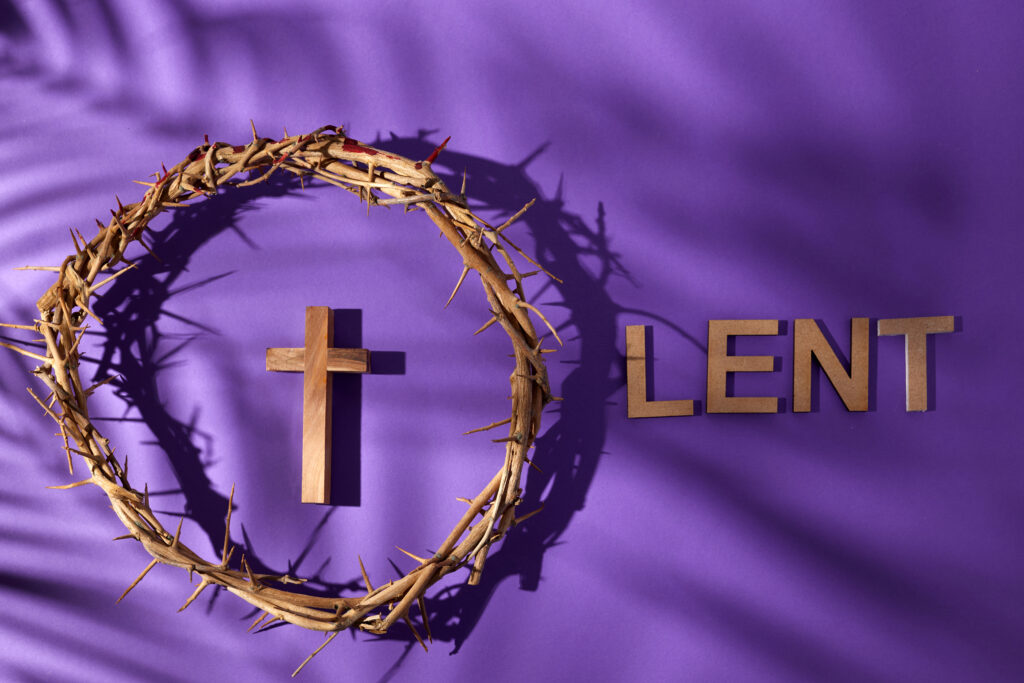
During Lent we walk with Jesus to the cross. We walk with the Messiah who had to suffer for our sake and our salvation; and we join in his work of redemptive suffering. We do penance and acts of self-denial, which train us to bear suffering for the love of God. And if we are going through a time of actual suffering because of difficult life circumstances, such as illness or confronting real evil and injustice in society, we carry the cross of that suffering because it too can become life-giving and redemptive through Christ.
Let us especially carry in our hearts the suffering people in the Ukraine, the suffering people in Gaza and Israel, the suffering people escaping violence and migrating for a safer life, the suffering people who live on our streets, the suffering people in difficult marriages and unhealthy relationships, the suffering women and couples and their unborn child in a crisis pregnancy, and…(you add your list).
Such a somber and serious season needs a party, one last “hurrah,” to help us enter into it properly. Thus in Catholic countries all over the world the season of “Carnival” and “Mardi Gras” is celebrated before Lent. A very appropriate way to bring closure to Carnival and Ordinary Time and transition into the penitential season of Lent is literally to bury the word “Alleluia.” That word, usually sung before the reading of the Gospels at Mass, is not sung during Lent. It will not be heard again until the Easter vigil when the Church celebrates the resurrection of Jesus, who is God’s “Alleluia” to the world.
So, sometime this weekend, gather with your family and friends to transition into the Lenten season and bury the “Alleluia” using the following prayer service, or something similar.

Bury the Alleluia in Preparation for Lent – A prayer service to help you and your family, prayer group, office, and/or parish prepare for Lent. You can do this any day during the week of Ash Wednesday to the first Sunday in Lent.
Materials: Take a legal size sheet of paper and, using a marker, write in large print “Alleluia.” Have other markers of different colors available. You will also need a shovel.
Leader Lent is upon us. It is the time we remember when God’s “Alleluia,” Jesus, took away the sins of the world through his death on the cross.
All Alleluia! Alleluia! Alleluia!
Leader The word “Alleluia” is a Hebrew word which means “Praise the Lord.” It is appropriate to call Jesus “God’s Alleluia” because his entire life was an act of praise and worship of God.
R1 Jesus is the word of God who is fully human and fully God.
All Alleluia! Alleluia! Alleluia!
R2 Jesus was obedient to Mary and Joseph, and from them he learned to do his Father’s will.
All Alleluia! Alleluia! Alleluia!
R3 Jesus preached the Kingdom of God. He invited women and men to repent and believe in the good news of God’s immense love breaking into human history.
All Alleluia! Alleluia! Alleluia!
R4 Jesus gathered together a community of disciples, women and men, and taught them the Beatitudes.
All Alleluia! Alleluia! Alleluia!
All Our Father…
Lent, “The White Rose,” and These Troubled Times
By Robert Fontana

I do love Lent, which begins on Ash Wednesday (March 5), but I resist it as well. Lent invites me to consider what is at the heart of being a disciple of Jesus – love of God and neighbor, especially those who are poor, marginalized, and scapegoated. I resist because, well, I don’t always want to be challenged to correct a fault or engage an issue that might take time, energy, and money.
I have also come to suspect the surface piety of Lent – adding fast days, praying the rosary every day or attending daily Mass – when it doesn’t also reach down to one’s heart. We become complicit in the sins of the culture when we just reinforce a cultural Catholicism that keeps us focused on our personal salvation (and that of our family members) but ignores the suffering of “my neighbor” in society.
Christian on the outside, but opposite on the inside. This is not new to Catholicism specifically or to Christianity in general. I’m reading the biography of the abolitionist and formerly enslaved Frederick Douglas. He writes bitingly against the slaveholders from the South who got on their knees at night in prayer, read the Scriptures daily, and faithfully attended church on Sunday. Yet these same men and women enslaved human beings, fed them starvation diets, beat them on a whim, raped the women, ignored their own children born from rape, and worked all the enslaved people, children to old people, from dawn to dusk.
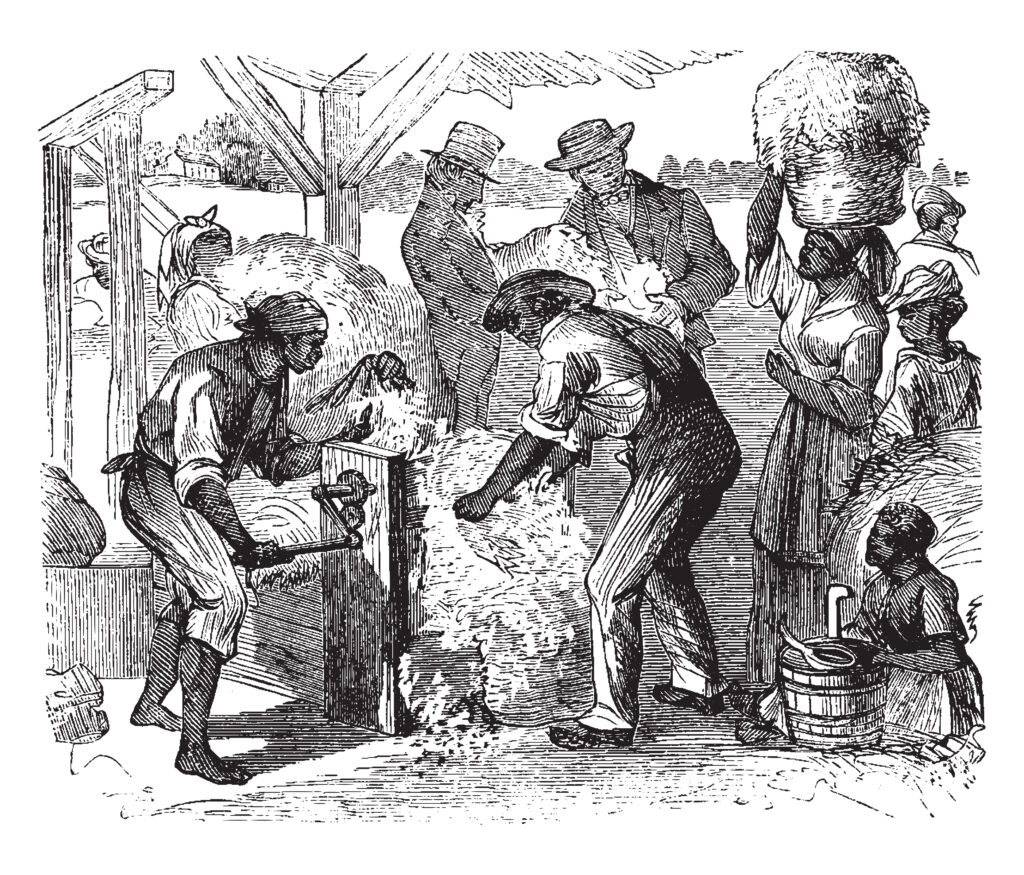
Douglas writes, “I can see no reason, but the most deceitful one, for calling the religion of this land Christianity. I look upon it as the…boldest of all frauds, and the grossest of all libels. Never was there a clearer case of ‘stealing the livery of the court of heaven to serve the devil in.’ I am filled with unutterable loathing when I contemplate the religious pomp and show, together with the horrible inconsistencies, which every where surround me.”[1]
Among these Christian slaveholders were many Catholics including Jesuits who enslaved hundreds of men, women, and children on their farms in Maryland.[2]
One of the critiques of the Catholic Church in Europe following World War II was that it was more concerned with self-preservation than about the general welfare of the people being persecuted by the Nazis, especially the Jews, but also communists, Protestant intellectuals, Roma people, and homosexuals.[3] In a sobering response to the failure of the Catholic Church to respond to the social crisis created by the Nazis, the bishops at the 2nd Vatican Council, in a deliberate effort to be faithful to the Gospel, committed the church to advocate for and stand in solidarity with suffering humanity:
The joys and the hopes, the griefs and the anxieties of the men of this age, especially those who are poor or in any way afflicted, these are the joys and hopes, the griefs and anxieties of the followers of Christ. Indeed, nothing genuinely human fails to raise an echo in their hearts.[4]
Five outstanding Nazi opponents from within Germany were university students : Hans and Sophie Scholl (brother and sister), Alexander Schmorell, Willi Graf, and Christoph Probst, led by their philosophy professor, Kurt Huber. They formed an anti-Hitler group called The White Rose, a reference to all that was beautiful, good, and Christian about their Germany before the Nazi takeover. (see https://jetsettimes.com/countries/germany/munich/the-white-rose-movement/}
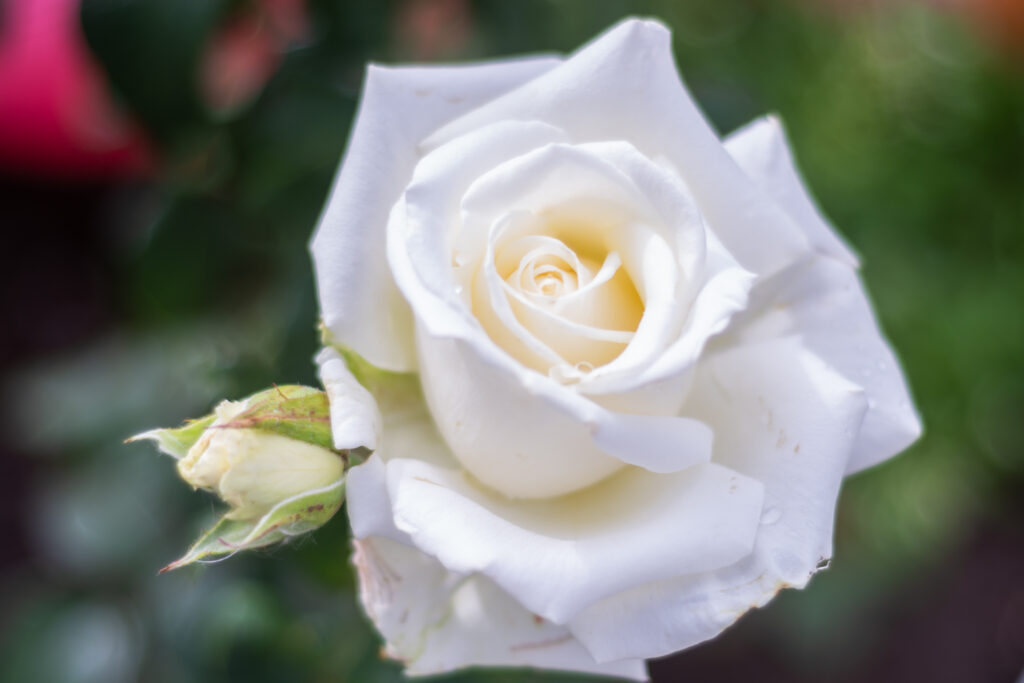
“The group wrote, printed and initially distributed their pamphlets in the greater Munich region. Later on, secret carriers brought copies to other cities, mostly in the southern parts of Germany. In July, 1943, Allied planes dropped their sixth and final leaflet over Germany with the headline “The Manifesto of the Students of Munich”…They denounced the Nazi regime’s crimes and oppression, and called for resistance…they openly denounced the persecution and mass murder of the Jews.” (https://en.wikipedia.org/wiki/White Rose)
They were captured in 1943, humiliated at a public trial, and three were sentenced to death by guillotine: Hans and Sophie Scholl, and Christoph Probst. What courage!
That brings me to these “Troubled Times.” Chaos reigns from the White House. Federal workers are being fired on a whim. Federal agencies that serve the American people, from its national parks, to disease prevention, education and even Medicaid, are being undermined. Our closest neighbor nations are being threatened, American allies are being bullied, and dictators are being embraced. And tragically, men, women, and children, fleeing their home countries because of poverty and violence are scapegoated as rapists and murderers who need to be rounded up and deported. (At least the Catholic bishops have gained a spine to speak out against this travesty.)
Every Christian, Catholic and Protestant, shaped by the ethics of the prophets from the Hebrew Scriptures and by the example and teachings of Jesus, cannot help but be outraged at the injustices coming from the White House. This is not a partisan issue. Conservatives like former vice-president Mike Pence, Liz Cheney, and Adam Kinzinger, all fully committed to the president’s agenda in his first term, are severe critics in his second.
Ask yourself, is this the path that I want the United States of America to travel? Consider the courage of the Munich martyrs when they did their part to stand up to Hitler. What will you and I do to confront the areas of darkness unfolding before us now?
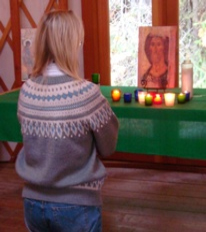
During this Lent I pray that you and I will take moments to meditate on the Scriptures especially the writings of the prophets and the four Gospels. One passage that stands out for me is Micah 6:8:
He has shown you, O mortal, what is good. And what does the Lord require of you? To act justly and to love mercy and to walk humbly with your God. (New International Version)
[1] Douglas, Narrative of the Life of Frederick Douglass, an American Slave. p. 107-108, Modern Library, NY, NY © 2000.
[2] https://en.wikipedia.org/wiki/1838_Jesuit_slave_sale
[3] https://en.wikipedia.org/wiki/Reichskonkordat
[4] Pastoral Constitution of the Church in the Modern World, Article 1
Spring cleaning on St. Brigid’s Day (Feb 1) and other non-essential Catholic practices that enrich faith
By Robert Fontana

St. Brigid is one of three patron saints of Ireland along with St. Patrick and St. Columban. Her feast day, February 1, also marks the first day of Spring in Ireland. A person could go all his or her life without having fun with a spring cleaning on St. Brigid’s Day, as we outline below, and still be a very fine Christian. Obviously the same is true for another unique event for Catholics coming up on March 5, Ash Wednesday. These events have some hands-on gestures and rituals that may seem odd to the casual observer. On Ash Wednesday we receive a cross of ashes on our foreheads. On the eve of St. Brigid’s Day (February 1), we use a kerchief to literally swipe our homes clean and symbolically remove it of “sin and selfishness.” Then we tie the cloth to a tree, where the spirit of St. Brigid and the Holy Spirit, come to take the sins away. These faith-based rituals can be somber, as in receiving ashes on Ash Wednesday, or fun as on St. Brigid’s Day. What they do is help us sanctify the day, making it special by allowing our entire body to participate in the meaning of the day. The actions and gestures of these events are an outward sign, a symbolic gesture, of our belief as disciples of Jesus, yet they are not essential to discipleship.
What are the essentials of being a disciple of Jesus anyway? Here are a few that come to mind: belonging to a community of faith that follows Jesus; encountering Jesus in a personal way and making a conscious decision to follow him by living out the Beatitudes; opening one’s life to the Holy Spirit; belonging to a small group where one is personally loved and held accountable as a disciple; participating in public worship and community rites; maintaining a consistent prayer life that involves the praying/studying of Scripture; engaging one’s faith within daily life; caring for the sick, elderly, poor, and for children.

These “essentials” are the “meat and potatoes” of following Jesus but, to continue the food analogy, without much seasoning or dessert. I think that it’s the addition of the non-essentials that adds spice and fun to one’s faith. For example, the liturgical year that divides up secular time into sacred seasons of Advent/Christmas, Lent, Easter/Pentecost, and Ordinary Times, is certainly not an essential feature of being a Christian. Some deeply Christian denominations function perfectly fine without a “liturgical year.” Yet we Catholics, joined by the Orthodox and mainline Protestants, find it extremely useful to organize the year around the major themes of Jesus’ life, death, and resurrection. In doing so, we think we are better able to tell the story of Jesus’ life and integrate His message in our lives today.
The “Sign of the Cross” is another non-essential and arbitrary practice that Christians do that has helped shape an identity that is deeply Christian and Catholic. In that one action, we remind ourselves of the saving work of Jesus through his death on the cross, and of our dependence on the Trinity, Father, Son, and Holy Spirit. Can a person be a good Christian and never make the “sign of the cross”? Most certainly. Some Christians bow their heads when they begin a prayer. Catholics (and Orthodox) make the “Sign of the Cross.” It summons us to quiet ourselves, and be attentive to what God is doing in the moment, whether it be followed by the blessing of a meal or the committal of a beloved family member to the grave.
I think a relationship with Mary, the mother of Jesus, especially manifested through the practice of praying the rosary, is a non-essential practice of Christian discipleship. One could go his or her entire life without ever praying to Mary, much less saying the rosary, and still be a deeply committed follower of Jesus. St. Paul makes no mention of Jesus’ mother except in one obscure text in Galatians (4:4). Certainly Paul never prayed to Mary and never thought that what she brought to the life of a disciple was important enough to write about. Protestants, taking their cue from Paul, also do not pray to Mary (or the saints) and yet are still following Jesus as committed disciples. Mary and the rosary are non-essentials to Christian discipleship. But I believe a devotion to Mary, so deeply imbedded in Catholic culture, is a wonderful gift from God that deepens faith, hope, and love.
Of course, there are many other non-essentials such as observing the feast days of saints, praying to St. Anthony for lost items, blessing pets on the feast of St. Francis, wearing religious medals and scapulars, lighting candles as a prayer offering, fasting on Wednesdays and Fridays, and “burying the Alleluia” on Mardi Gras, the Tuesday before Ash Wednesday. None of these practices is essential to Christian discipleship and, if done these are done apart from the essentials, they have little meaning. But when these rituals are done in conjunction with being an active follower of Jesus, they have the capacity to shape a Catholic Christian identity that gives a person deeper roots and brings joy and fun to the Christian life.
So add some spice to your faith life. On St. Brigid’s Day (Feb. 1), wipe your home clean of sin, and on Mardi Gras (Mar 4) bury the Alleluia (see rituals below). Then on Ash Wednesday (Mar 5), the very next day, go to the nearest Catholic Church and get your ashes.
______________________________________
St. Brigid’s Day “Spring Cleaning” (February 1)
Prayer: Saint Brigid, daughter of Ireland and lover of Jesus, draw us by your prayers into the living flame of God’s love. Help us to clean our hearts and homes of all that is selfish and self-centered. We forgive all who have hurt us and ask God to forgive our sins as well.
Pray for us, St. Brigid, that we will be attentive to the poor and spiritually abandoned, that we will practice the Beatitudes in good times and bad, and that the warmth of God’s love will animate all that we say and do.
Activity: Each member of the home takes a kerchief or handkerchief in hand and walks through the house dusting the furniture and books, and lamps, etc. singing “Alleluia, alleluia, alleluia.”
When the house has been thoroughly dusted, all go outside and tie the kerchiefs on the branches of a tree. The myth is that, on the eve of her feast day, St. Brigid, in the grace of God and the power of the Holy Spirit, travels through the land with her prayers to remove the dust and sin, and even ailments, from our lives.
Closing Prayer: St. Brigid, come this day, to our home and hearts, come by the power of God, and be our guest. And help us, dear Brigid, to wipe away the dust of “me, my, and mine” that we might love others with a selfless heart. Amen.
Our Father…
Leave the kerchiefs and handkerchiefs on the tree for a week or until Ash Wednesday.
BURY THE ALLELUIA on “Mardi Gras (Mar 4)” the day before Ash Wednesday (Mar 5)

All Alleluia! Alleluia! Alleluia!
Leader For the 40 days of Lent the Church “buries the Alleluia” by refraining from singing this sacred word in our liturgy. We do so to remember the Lord Jesus, God’s alleluia, the Lamb of God, who took the sins of the world with him to the grave so as to rob them of their power to destroy life.
What are the sins of the world today that destroy life? Say them aloud as you write them on a sheet of paper bearing the word “Alleluia.”
[After all have done so the “Alleluia” is placed in the ground and buried with dirt in the same way that Jesus who died for the sins of the world was placed in a tomb following his death.]
All Gracious God and Father, your beloved Son Jesus suffered death to give us life. Help us during this Lenten season to deny ourselves and serve others in imitation of Him who lives with you, and the Holy Spirit, one God forever and ever. Amen!
Imagine fleeing your home with children because…
by Robert Fontana
…you have learned that local thugs and gang members are targeting young girls in your neighborhood for kidnapping. The girls are given over to gang members as “wives.” Imagine also that you know from previous experience that the local police and government officials are powerless to do anything about it. What would you do? What would you do if you were poor and did not have political or family connections with resources to help you?
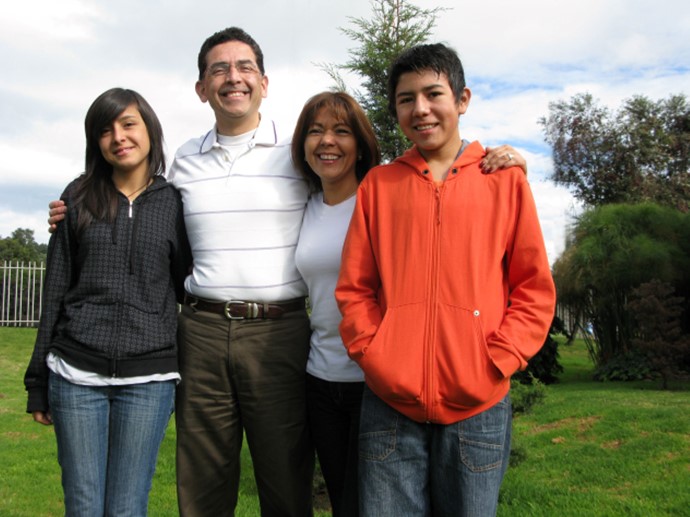
You would probably do what Juana and Jose (not their real names) from Columbia did. With their two children, a teen and a young child, they set out on the long walk to the United States, seeking asylum and a new, safe life in the U.S. You might very well do this same thing because you’d have heard through the migrant grapevine that American law states that any person who arrives onto U.S. soil and requests asylum has the right to a hearing before an immigration judge.
Any alien who is physically present in the United States or who arrives in the United States (whether or not at a designated port of arrival and including an alien who is brought to the United States after having been interdicted in international or United States waters), irrespective of such alien’s status, may apply for asylum in accordance with this section or, where applicable, section 1225(b) of this title. 8 U.S. Code § 1158 – Asylum (https://www.law.cornell.edu/uscode/text/8/1158)
Juana and Jose began their long pilgrimage in early December, 2023. Almost immediately they faced the perils of crossing the “Darien Gap,” which according to Wikipedia is “a geographic region that connects the American continents, stretching across southern Panama‘s Darién Province and the northern portion of Colombia‘s Chocó Department. Consisting of a large drainage basin, dense rainforest, and mountains, it is known for its remoteness, difficult terrain, and extreme environment, with a reputation as one of the most inhospitable regions in the world.”
The Darien Gap is not only physically challenging to cross because of its difficult terrain, it is also dangerous to cross because of snakes and other wild animals and because of the presence of gangs that prey on migrants.
Juana reported that over the three days it took them to cross through the Darien Gap they were always wet because of rainfall and having to cross rivers and streams. They were not alone. They met other people fleeing their homelands and heading towards the United States. They made it to Nicaragua, then Guatemala, and arrived in Mexico in February. They were assisted at times by churches with food and water. At other times they had to work menial jobs to earn money to buy food or a bus ticket. There were many days with little or no food or water. They slept on the side of the road, in parks, church yards, and occasionally in a hotel where they could also shower.
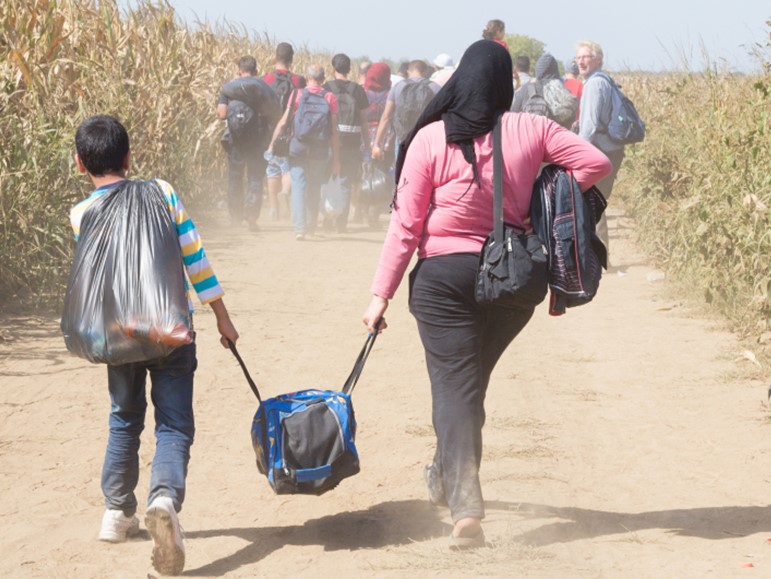
Twice, after traveling to Northern Mexico, Mexican immigration officers picked them up and returned them to southern Mexico near the Guatemalan border. Undaunted, knowing what waited for them back in Columbia, they both times began the trek north again. They did a variety of jobs to earn money to buy bus fares: washing dishes, cleaning houses and yards, waiting on tables. They were occasionally robbed but, thank God, never physically injured, though they witnessed other migrants being attacked and physically harmed.
Arriving in Mexico City a second time, they tried to apply for asylum online through a program set up by the Biden administration. They tried this online application repeatedly over a one-month period without hearing from any immigration official. Finally, Jose decided to hop on a train north to the Mexico – U.S. border, thinking he would find work in the U.S. and send money back to Juana and the children. Juana worked, earned money for bus fare, and was finally able to travel with her two children to Juarez, Mexico, across the border from El Paso, TX, in May.
She crossed into the U.S. at an immigration checkpoint and asked for asylum. Immigration officers took her and the children into custody. After conducting a background check, immigration released Juana and family to Annunciation House, a Catholic shelter system for migrants directed by Ruben Garcia. Mom and children were granted approval to have their asylum claim heard.
Lori and I arrived in El Paso in June to volunteer at Annunciation House where we met Juana and children. The family later learned that Jose was in a detention center in Houston and would probably be deported. Lori worked with the family to get immunizations and other medical care, and I worked with them to learn some English. And we all worked together with all the guests at the shelter to do laundry, mopping and cleaning, meal preparation, and dishwashing.
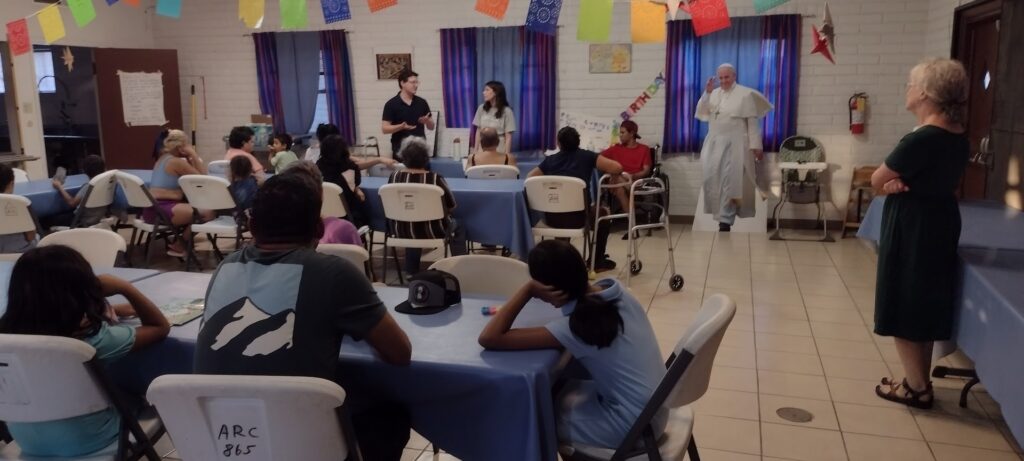
Juana, however, had a problem. Most families asking for asylum in the U.S. have a contact in the country, a family member or friend, who will host them as they wait for their immigration hearing. Juana’s contact had fallen through. When we left in early August, she and family were essentially stuck at the El Paso shelter. After a few more months passed, the shelter director asked if we would consider hosting the family here in Seattle. Lo and behold, our parish had a connection for a very vital need: a small studio apartment for them.
Juana and family arrived in Seattle the first week of December. Two of our daughters and a few parish families are bi-lingual, and that’s been such a blessing – to connect Juana with some Spanish-speaking families. Lori and I lean heavily on Google Translate, which works surprisingly well, though it’s slow-going. The younger child will begin Pre-K at the parish school; the teen will take the ELL course at the community college in the spring. We’ve found an English language tutor for Mom and teen. Lori is searching for a pro-bono immigration lawyer.
No one would make the journey that Juana and her family made unless the threat to their lives was very real. With honest reflection, I think you or I would have done the same thing. Please remember this family, and all migrants, in your prayers. We’ll keep you updated on their progress.
A 5 minute Christmas Homily
Dear Friends, the Christmas homily ought to be short! The meaning of the day is made abundantly clear in the carols sung, the readings proclaimed, the liturgy prayed, and the festivities in the home. The homilist need only add an exclamation point to what the Christmas liturgy shouts out with joy, that the beloved son of God was born of Mary! Here’s my Five-Minute Christmas Homily for 2022.
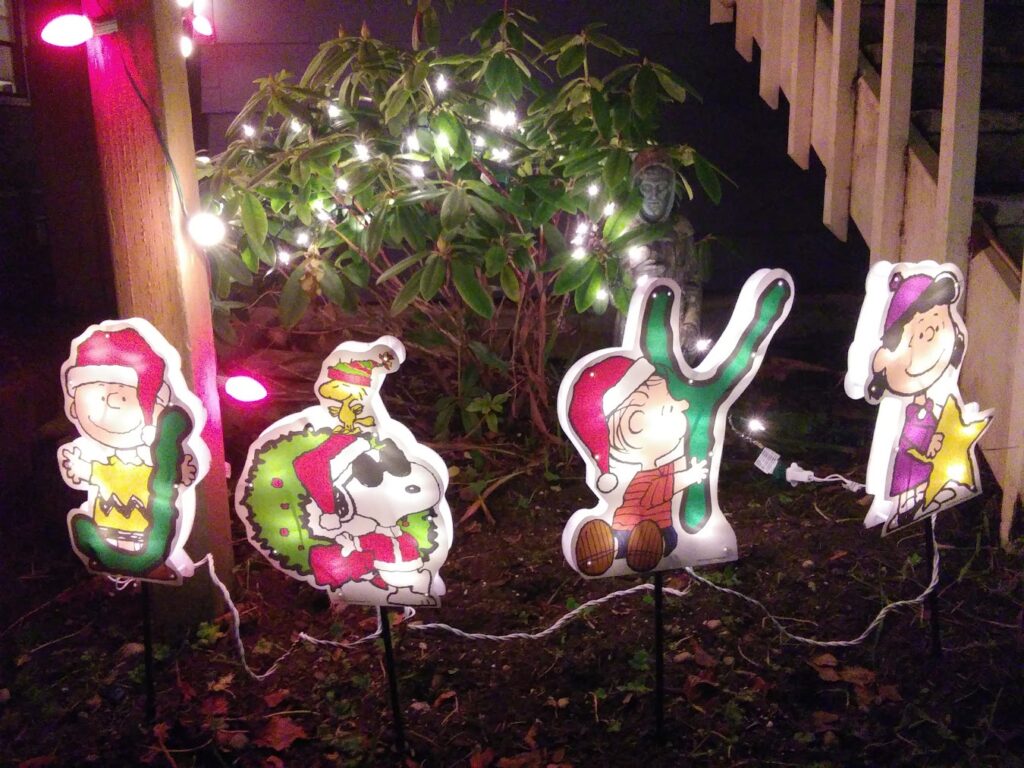
Robert: Merry Christmas, everyone. [Robert sings.] It’s beginning to look a lot like Christmas, everywhere you go. People are going to pray. They’re listening every day, to stories from the Bible all aglow.
Oh…wait a minute. Wrong words…how does the song go? (sing with me if you know it):
It’s beginning to look a lot like Christmas, everywhere you go. Take a look at the five and ten, it’s glistening once again with candy canes and silver lanes aglow. It’s beginning to look a lot like Christmas, toys in every store. But the prettiest sight to see is the holly that will be on your own front door.
Wow. The writer of that Christmas song sure got it wrong. Sure, candy canes and silver lanes aglow are fun, and buying toys in every store keeps the economy going but, are these the real signs of Christmas? Everybody, shout, “NO!”
All: NO!
Robert: We just need to look to the beautiful people in the Christmas story for the true signs that indicate Christmas is here. But I need your help in this Gospel reflection. When I raise my hand, would you shout out, “It’s beginning to look like Christmas!” Let’s practice. [Robert raises his hand.]
All: IT’S BEGINNING TO LOOK A LOT LIKE CHRISTMAS!
Robert: When you and I, like Mary, open our hearts to the love of God, when we say, “Yes!” to following his will for our lives, then…[ Robert raises his hand.]
All: IT’S BEGINNING TO LOOK A LOT LIKE CHRISTMAS!
Robert: When you and I, like Joseph, have the courage to stand up for what is right and protect the innocent, from babies to migrants to caring for our beautiful earth, then… [Robert raises his hand.]
All: IT’S BEGINNING TO LOOK A LOT LIKE CHRISTMAS!
Robert: When you and I who are struggling in marriage and family, love one another like Mary and Joseph, forgive each other any hurt we may have caused, and work to restore friendship and affection, then…
All: IT’S BEGINNING TO LOOK A LOT LIKE CHRISTMAS!
Robert: When you and I, like the Magi, can discern when the political powers are trying to manipulate us, and we do not play their games but instead listen to the Holy Spirit speaking to our hearts, thereby thwarting their evil machinations, then… [Robert raises his hand.]
All: IT’S BEGINNING TO LOOK A LOT LIKE CHRISTMAS!
Robert: And when you and I, like the angels in the sky, gather for worship, lift our voices to heaven to sing glory to God in the highest, listen to the Word of God, and receive the Eucharist, then… [Robert raises his hand.]
All: IT’S BEGINNING TO LOOK A LOT LIKE CHRISTMAS!
Robert: And lastly, when we make room in the “inn of our hearts” and walk with the shepherds of the world, with those hard-working laborers, with families who struggle to make ends meet; when we accompany them to Bethlehem to be with the Christ Child and Mary and Joseph, where there is neither rich nor poor, slave nor free, woman nor man, but we are all one in Christ, then… [ Robert raises his hand.]
All: IT’S BEGINNING TO LOOK A LOT LIKE CHRISTMAS!
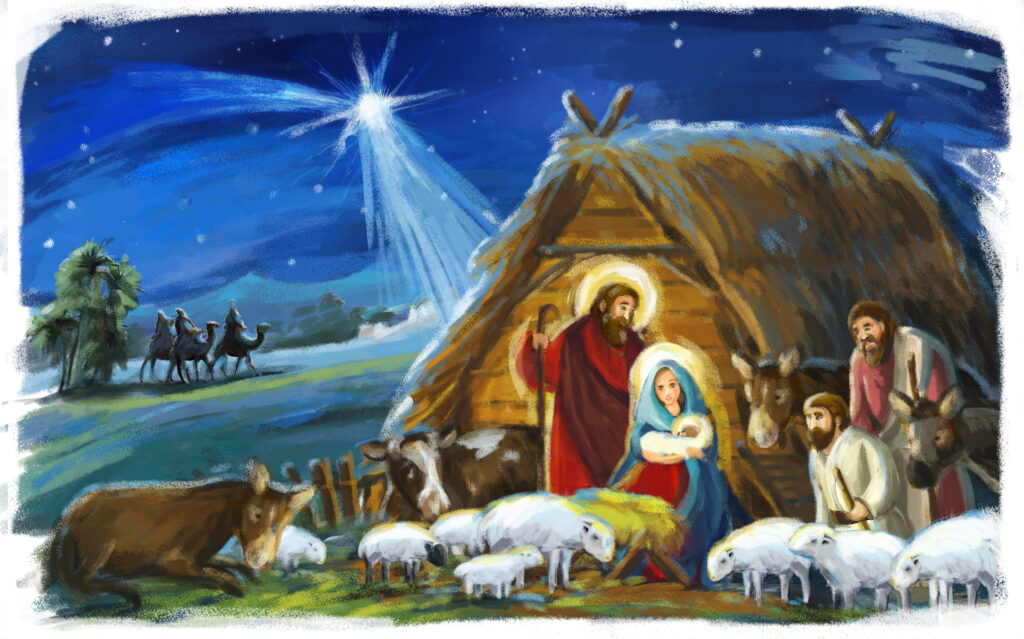
Robert: Decorations are nice; gifts are wonderful to give and receive. But it’s truly Christmas when our joy, celebrations and sharing of gifts spring from the profound knowledge that we are deeply loved by God through the gift of Jesus and we share that love with all we meet. Knowing this, we can live Christmas every day of the year. So, friends, let’s show the world what Christmas really looks like! Because when we do, all people will know that… [Robert raises his hand.]
All: IT’S BEGINNING TO LOOK A LOT LIKE CHRISTMAS!
An Advent Meditation by Mother Teresa
(Given at the first World Youth Jubilee in Rome, 1983)
Who do you say I am? (Matthew 16:15)

You are God. You are God from God. You are begotten, not made. You are One in Substance with the Father. You are the Son of the living God. You are the Second Person of the Blessed Trinity. You are One with the Father. You are in the Father from the beginning. All things were made by you and the Father. You are the Beloved Son in whom the Father is well pleased. You are the Son of Mary, conceived by the Holy Spirit in the womb of Mary.
You were born in Bethlehem. You were wrapped in swaddling clothes by Mary and put in the manger full of straw. You were kept warm by the breath of the donkey who carried your Mother with you in her womb. You are the Son of Joseph, the carpenter as known by the people of Nazareth. You are an ordinary man without much learning as judged by the learned people of Israel.
Who is Jesus to me?
Jesus is the Word made Flesh. Jesus is the Bread of Life. Jesus is the Victim offered for our sins on the Cross. Jesus is the Sacrifice offered at the Holy Mass for the sins of the world and mine.
Jesus is the Word — to be spoken.
Jesus is the Truth — to be told.
Jesus is the Light — to be lit.
Jesus is the Life — to be lived.
Jesus is the Love — to be loved.
Jesus is the Joy — to be shared.
Jesus is the Peace — to be given.
Jesus is the Bread of Life — to be eaten.
Jesus is the Hungry — to be fed.
Jesus is the Thirsty — to be satiated.
Jesus is the Naked — to be clothed.
Jesus is the Homeless — to be taken in.
Jesus is the Sick — to be healed.
Jesus is the Lonely — to be loved.
Jesus is the Unwanted — to be wanted.
Jesus is the Leper — to wash his wounds.
Jesus is the Beggar — to give him a smile.
Jesus is the Drunkard — to listen to him.
Jesus is the Mentally Ill — to protect him.
Jesus is the Little One — to embrace him.
Jesus is the Blind — to lead him.
Jesus is the Dumb — to speak to him.
Jesus is the Crippled — to walk with him.
Jesus is the Drug Addict — to befriend him.
Jesus is the Prostitute — to remove her from danger and befriend her.
Jesus is the Prisoner — to be visited.
Jesus is the Old — to be served.
To me
Jesus is my God. Jesus is my Spouse. Jesus is my Life. Jesus is my All in All. Jesus is my Everything. Jesus, I love You with my whole heart, with my whole being. I have given Him all, even my sins and He has espoused me to Himself in tenderness and love.
Now and for life I am the Spouse of my Crucified. Spouse. Amen.
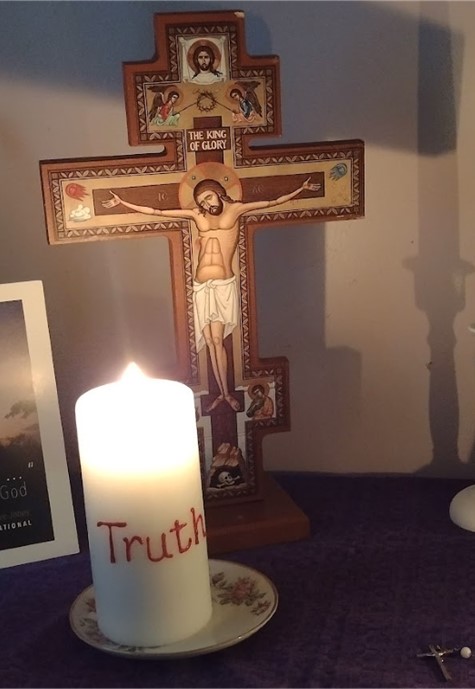
Is it Rocky vs Apollo Creed, David vs Goliath? No it’s…
By Robert Fontana

Yes, ladies and gentleman, the battle of the century is upon us (as it is every year). In one corner, dressed in red, sporting a white beard, wearing a night cap, and holding a sign that reads “Shop at Macy’s,” is COMMERCIAL CLAUS, or as popularly known, SANTA.

In the other corner, wearing a priestly stole, also sporting a white beard, and carrying gifts for the poor in one hand and the shepherds staff in the other, is St. Nicholas!
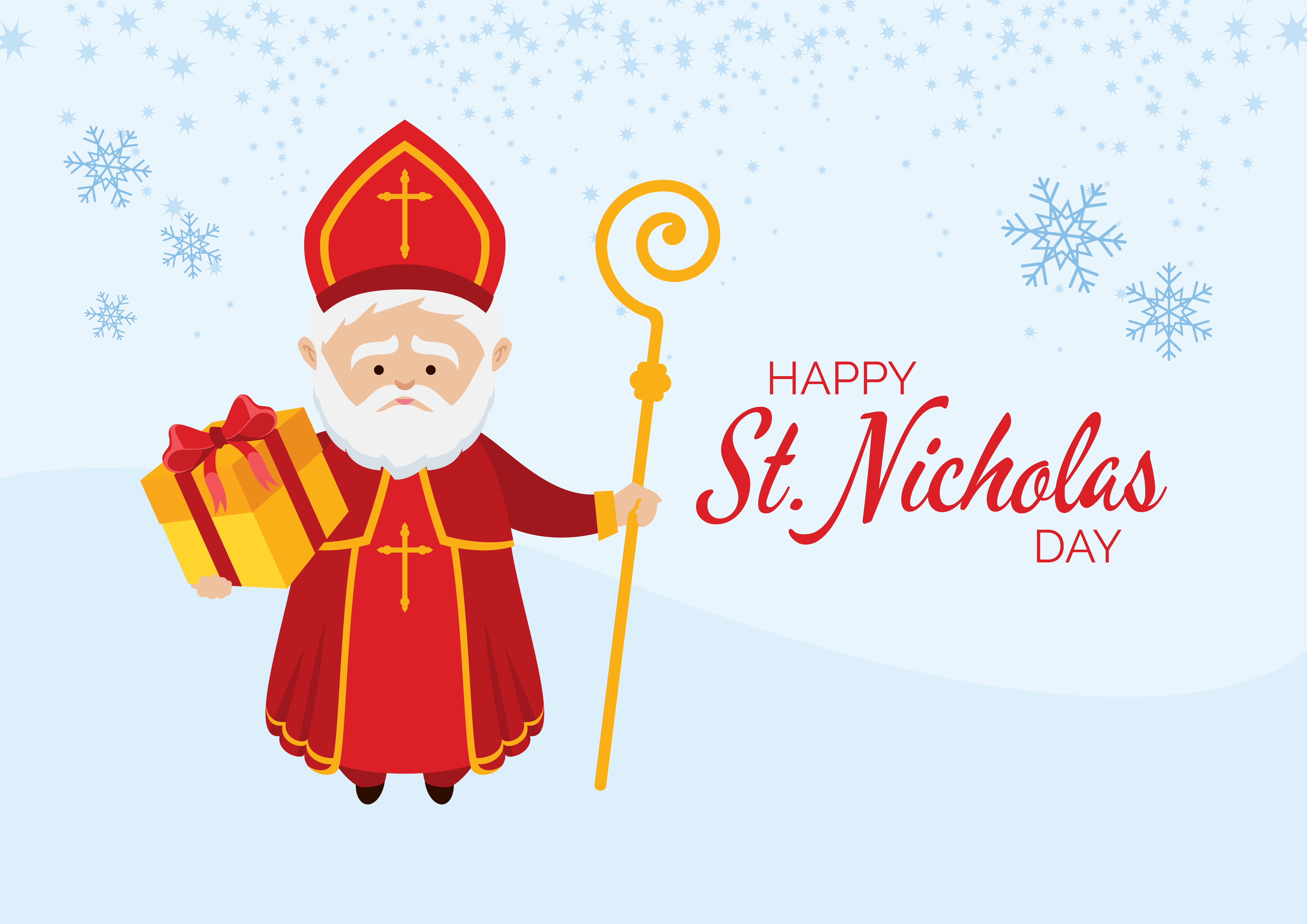
LET THE RUMBLE BEGIN! It is being fought in your heart and mine. Commercial Claus is backed by the trillion dollar commercial interests from Amazon to Walmart. St. Nicholas is backed by Jesus, the carpenter from Galilee, Francis and Clare from Assisi, disciples of Jesus today, and all men and women of good will who want children to know that they are loved for who they are and not for what they possess.
December 6 is the Feast of St. Nicholas, Bishop of Myra (in modern day Turkey). He had a reputation for secretly giving gifts to people in need, which led to the rise among pious Christians of the figure of Santa Claus (Sinterklaas (Dutch: [ˌsɪntərˈklaːs]) or Sint-Nicolaas – https://en.wikipedia.org/wiki/Saint_Nicholas). Sadly, as we all know, the commercial interest of secular culture have co-opted Santa Claus for its own purpose and few people know of the saintly figure behind the secular Santa (which, ironically, means “Holy.”).
Lori and I decided when our children were small to make the Feast of St. Nicholas a special day for them so that they would understand the Christian figure behind the Santa Claus story. We are continuing that custom with the grandchildren. On St. Nicholas Day morning, they will be opening their Christmas stockings, each containing a book, a candy treat, and an orange. (Here’s a you tube link for the story of St. Nicholas for children: https://www.youtube.com/watch?v=gfsGFHbCPCM)
Here’s a reflection on the difference between St. Nicholas and Santa Claus, followed by a prayer service that families (with or without children) or friends can do to honor St. Nicholas, disciple of Jesus, and friend of the poor.
- Santa wants your credit card; Nicholas wants your heart.
- Santa will turn you into a consumer; Nicholas will help you be a servant.
- Santa is a whimsical tale of a fat old elf who gives toys to boys and girls who have been good; St. Nicholas helped children escape from poverty and slavery.
- Santa reminds us to give presents; Nicholas reminds us to give ourselves.
- Santa is controlled by the department store; Nicholas was led by the Spirit.
- Santa is a man dressed in a costume; Nicholas was a Bishop who cared for his people.
- Santa reminds us to follow the Christmas sales; Nicholas reminds us to follow Jesus.
- Santa promises us happiness through gift-giving; Nicholas reminds us that happiness is the fruit of a faithful life.
- Santa is a fun story to read to children at Christmas Eve; Nicholas was a man of great compassion who sold his possessions and gave the money to the poor so that he could do God’s will in perfect freedom.
- Santa has nothing to do with Jesus the God-Man whose birth is celebrated on Christmas Day. Nicholas’ life only makes sense because of his love and commitment to Jesus the God-Man whose birth is celebrated on Christmas Day.
A Prayer Service for the Feast of St. Nicholas, Adapted by Robert Fontana from a prayer service by Thomas G. Simons from the St. Nicholas Center.
Call To Worship
Leader: Praise God for St. Nicholas!
Children: Yea St. Nicholas!
Leader: The Spirit of the Lord was upon him.
Children: Yea St. Nicholas!
Leader: Loving God, St. Nicholas loved Jesus, and because he loved Jesus he loved children and the poor. We honor his memory today and in doing so hope to imitate his kindness and love.
Children: St. Nicholas, pray for us. Amen!
Word Service – 1 Peter 5.1–4
The following summary of the life of St. Nicholas may be read and discussed.
St. Nicholas was born to Christian parents. Legends recount the story of Nicholas’ baptism when his parents brought him to the sacred fount; he leapt from his mother’s arms into the Baptismal waters. After the death of his parents, he gave away his inheritance to the poor of Myra, and dedicated himself to serve his people first as a priest and later as a bishop.
Bishop Nicholas preached the Gospel in a Roman culture still dominated by Greek and Roman religious customs and moral behavior. He organized Churched, taught the Catholic faith, and invited non-Christians to join the community of faith. He is most remembered as a helper to the poor and to children. Once Bishop Nicholas heard that a father was struggling to feed his three daughters. He did not have the money for a marriage dowry, and was considering selling them off into slavery so they would at least have something to eat. On three occasions, Bishop Nicholas threw a bag of gold through the window into the room of the sleeping father. His daughters soon were married. Later the father came to Nicholas, fell at his feet and said, “Nicholas, you are my helper.”
This story and his many other works of charity led to the tradition of giving presents on the Feast of St. Nicholas and at Christmas. The name Santa Claus, in fact, evolved from his name.
Bishop Nicholas proclaimed the Gospel, baptized new Christians, feed the hungry and poor, and taught the truths of Christianity. He died at Myra in 350 A.D. His popularity, already great, increased when his bones were brought to Italy in 1087. Both the Eastern and Western churches honor him. St. Nicholas is the patron saint of Russia, Greece, and Sicily. He is regarded as the special patron of children. His feast is day is December 6.